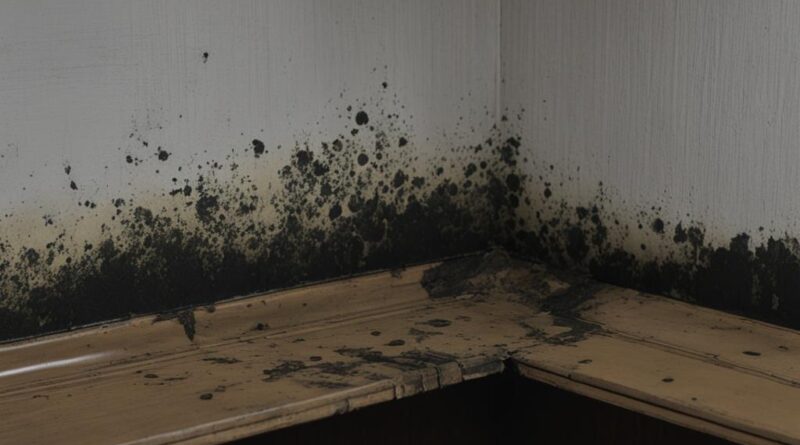Tenant Relocation Due to Mold: Your Rights & Options
Mold in rental properties can pose a serious health risk to tenants. It is important to understand your rights and options when it comes to tenant relocation due to mold. This article will provide information on the legal obligations of landlords, the steps tenants can take to address mold issues, and how to ensure a safe living environment.
Key Takeaways:
- Tenant relocation may be necessary when dealing with mold in rental properties
- Landlords have responsibilities for mold remediation and ensuring tenant safety
- Tenants should take steps to report mold problems and seek legal assistance if needed
- Mold removal and remediation should be done by professionals
- Understanding tenant rights and landlord obligations is crucial in addressing mold issues
Landlord Responsibilities for Mold Remediation
Landlords in Texas have important responsibilities when it comes to mold remediation in rental properties. Their duty is to address and resolve mold conditions that significantly impact the health and safety of tenants. However, there are certain conditions that must be met for these responsibilities to apply.
- Proper Written Notice: Landlords must receive written notice from tenants regarding the mold condition. This notice should clearly describe the extent of the mold problem and its potential health risks.
- Absence of Tenant-Caused Damage: Landlords are only responsible for mold issues that are not caused by tenant negligence or failure to maintain the property. If the mold is a result of tenant actions or negligence, the responsibility may fall on the tenant.
- No Delinquency in Rent: Landlords are obligated to remediate mold conditions as long as the tenant is current on rent payments. If the tenant is delinquent, the landlord may have the right to postpone remediation until the rent is paid.
Once these conditions are met, landlords have a reasonable amount of time to address the mold issues after receiving notice from tenants. This timeframe may vary depending on the severity of the mold problem and the resources available to the landlord.
It is crucial for landlords to fulfill their responsibilities to ensure the health and safety of their tenants. Failure to comply with these obligations can result in legal consequences, which may include potential lawsuits and compensation claims from affected tenants.
Mold Remediation Timeframes by Severity:
| Severity Level | Timeframe for Remediation |
|---|---|
| Mild to Moderate | Within 30 days |
| Moderate to Severe | Within 14 days |
| Severe | Within 7 days |
Please note: These timeframes are general guidelines and may vary based on specific circumstances.
Addressing mold issues promptly and effectively is in the best interest of both landlords and tenants. By fulfilling their responsibilities, landlords can maintain a safe and habitable living environment, while tenants can enjoy peace of mind and protect their health.
Steps to Take When Dealing with Mold
If you suspect mold in your rental property, it is important to take the following steps:
- Consult your lease agreement to understand your rights and responsibilities.
- Notify your landlord in writing about the mold problem, providing as much detail as possible.
- Request a mold inspection if necessary to confirm the presence and extent of the mold issue.
- If the landlord fails to address the problem, consider legal action or exploring other options for tenant relocation.
Mold testing and inspection are crucial in ensuring tenant safety and holding landlords accountable to their obligations. By following these steps, you can take proactive measures to address mold issues and protect your well-being.
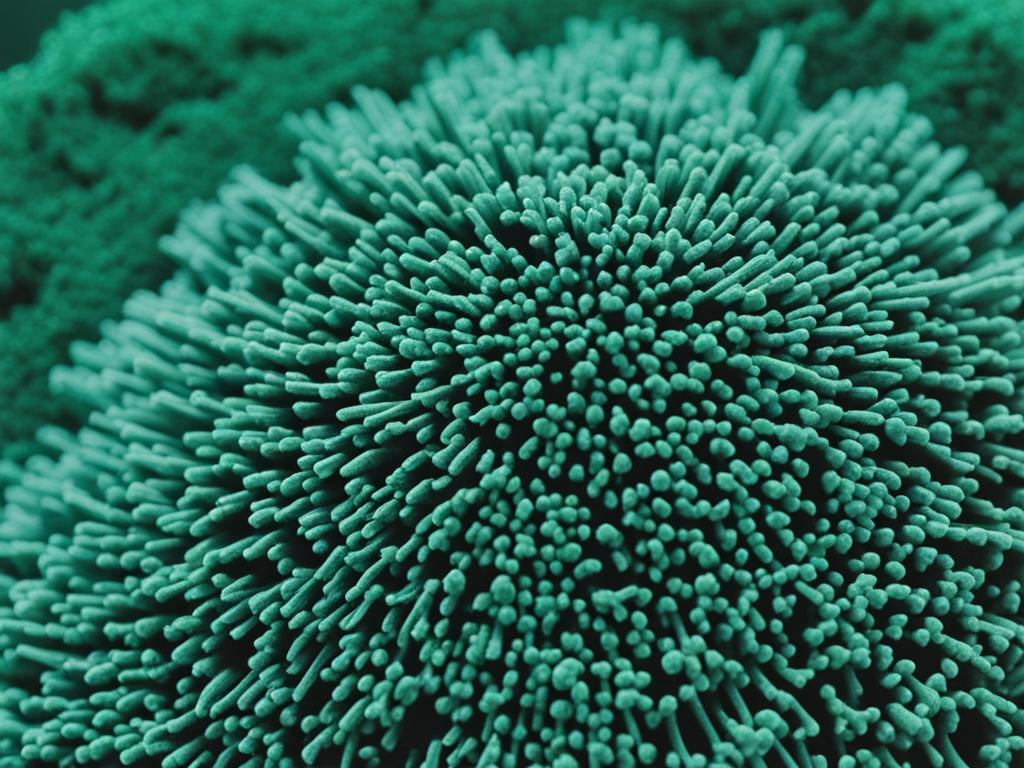
Taking prompt action is important when dealing with mold in your rental property. The image above represents the significance of mold testing in identifying and assessing mold growth. Schedule a professional mold inspection to ensure accurate and thorough evaluation of the mold problem in your rental unit.
Legal Options for Tenant Relocation
If you find yourself in a situation where your landlord refuses to address a mold problem in your rental property, there are legal options available to you for tenant relocation. It is essential to understand your rights and the appropriate legal procedures to follow before taking action.
Here are three possible legal options for tenant relocation:
- Ending the Lease and Moving Out: If the mold issue poses a significant health risk or makes your living conditions uninhabitable, you may have the right to terminate your lease agreement. Consult with a landlord-tenant lawyer to understand the specific requirements and steps for legally terminating your lease.
- Filing a Lawsuit Against the Landlord: In some cases, tenants may choose to take legal action against their landlord due to their failure to address a mold problem. By filing a lawsuit, you can seek compensation for any damages and legal fees incurred as a result of the mold issue. Talk to a lawyer specializing in landlord-tenant disputes to evaluate the strength of your case and determine the best course of action.
- Hiring a Contractor and Deducting Costs: Depending on your state’s laws and the severity of the mold issue, you may have the ability to hire a contractor to repair the mold problem and deduct the costs from your rent. This option typically requires providing written notice to your landlord and allowing them a reasonable amount of time to address the issue before taking matters into your own hands. Keep detailed records and consult with legal counsel to ensure compliance with local regulations.
To achieve the best outcome for your situation, it is crucial to consult with a landlord-tenant lawyer who specializes in mold-related cases. They can guide you through the legal process, protect your rights, and help you make informed decisions. Remember that legal actions should always be approached with careful consideration and professional guidance.
Always prioritize your health and well-being when dealing with mold issues in your rental property.
Mold Removal and Remediation
Mold removal and remediation are crucial steps in ensuring the safety of tenants and effectively addressing mold issues in rental properties. To guarantee that the process is carried out properly, it is essential for landlords to hire certified mold remediation professionals.
The process of mold removal and remediation typically involves the following steps:
- Identifying the source of moisture: Professionals will conduct a thorough investigation to determine the cause of mold growth. This may include inspecting for water leaks, plumbing issues, or inadequate ventilation.
- Repairing any leaks or water damage: Once the source of moisture is identified, repairs will be made to prevent further water intrusion and ensure a dry environment.
- Removing affected materials: Mold can spread and infiltrate various surfaces. Professionals will safely remove mold-infested materials such as drywall, carpeting, and insulation to prevent further contamination.
- Cleaning the area: The affected area will be meticulously cleaned using appropriate cleaning agents and techniques. This helps eliminate any remaining mold spores and ensures a thorough removal process.
By following these steps, mold professionals can effectively eliminate mold growth and create a safe living environment for tenants.
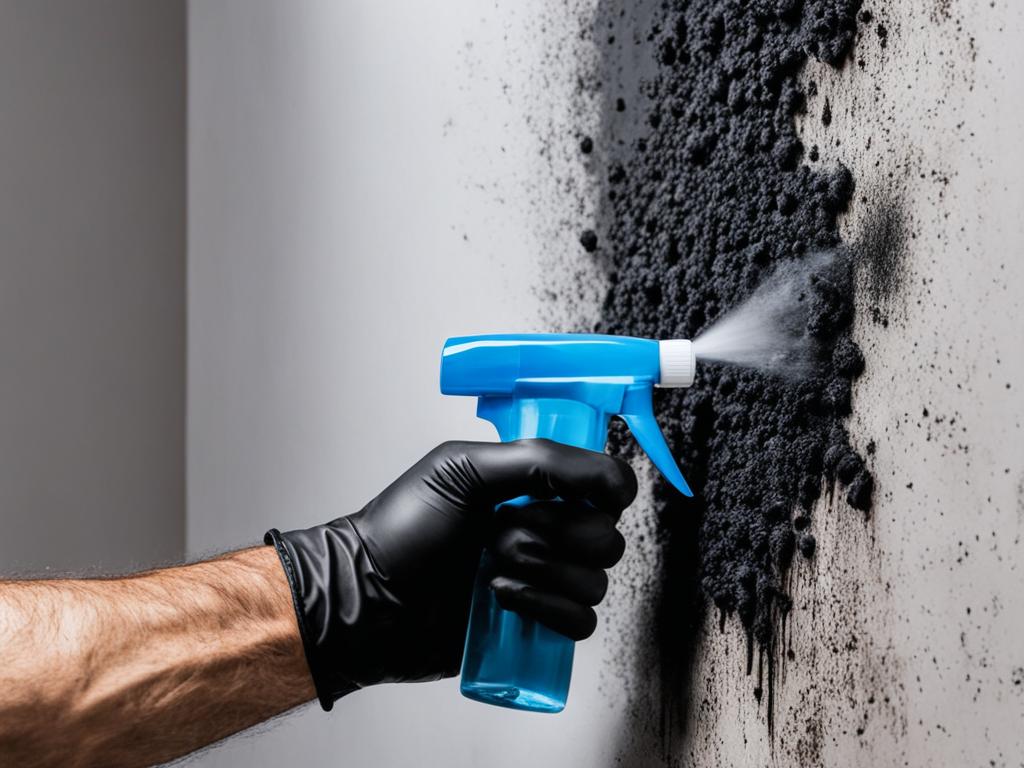
It is important to note that mold removal and remediation should always be performed by professionals due to the potential health risks associated with mold exposure. Certified mold remediation professionals have the knowledge, experience, and proper equipment to handle mold issues safely and effectively.
| Benefits of Professional Mold Removal and Remediation |
|---|
| 1. Ensures thorough removal of mold spores and prevents further contamination. |
| 2. Reduces the risk of mold-related health issues for tenants. |
| 3. Addresses the root cause of mold growth to prevent future outbreaks. |
| 4. Provides peace of mind for both landlords and tenants. |
Landlords should prioritize the health and safety of their tenants by promptly addressing mold issues and hiring certified professionals for mold removal and remediation.
Tenant Rights and Protections
Tenants have the right to live in a safe and habitable environment. This includes protection from hazardous living conditions such as mold. Mold can have detrimental health effects, especially for individuals with allergies, asthma, or compromised immune systems.
When landlords fail to address mold issues in a timely manner, tenants have legal grounds to protect their rights and well-being. Here are some important tenant rights and protections:
Mold Inspection and Remediation
Tenants have the right to request a professional mold inspection if they suspect the presence of mold in their rental property. Landlords are responsible for addressing mold issues promptly and correctly to ensure the safety and well-being of their tenants.
Right to Repairs
If mold is found in a rental property, tenants have the right to request repairs to remove the mold and fix any underlying causes, such as water leaks or poor ventilation. Landlords are responsible for ensuring a habitable environment and should take appropriate action to remedy the mold problem.
Compensation for Damages
If tenants suffer health effects or property damage due to mold exposure that could have been prevented by the landlord’s actions, they may be entitled to seek compensation. This compensation can cover medical expenses, property repairs, and other damages resulting from the hazardous living conditions.
Lease Termination
In severe cases where the mold issue persists despite the landlord’s attempts to remediate it, tenants may have the right to terminate their lease without penalty. This option allows tenants to prioritize their health and seek alternative, mold-free housing.
To protect their rights and ensure a safe living environment, tenants should:
- Notify the landlord in writing about the mold problem, providing detailed documentation and evidence.
- Keep a record of all communication with the landlord regarding the mold issue, including dates and responses.
- Consult with a landlord-tenant lawyer to understand their rights and options if the landlord fails to address the mold problem.
Preventing Mold in Rental Properties
Both landlords and tenants have a role to play in preventing mold in rental properties. By taking proactive measures and following best practices, the risk of mold growth can be significantly reduced.
Landlord’s Obligations:
Landlords have a responsibility to maintain the rental property and address any potential issues that could lead to mold growth. Some key obligations include:
- Regular property inspections to identify and address water leaks or moisture issues promptly.
- Promptly repairing any leaks, plumbing issues, or water damage that may contribute to mold growth.
- Ensuring proper ventilation throughout the property, especially in high-moisture areas like bathrooms and kitchens.
- Providing tenants with guidelines on how to prevent mold and promoting good housekeeping practices.
Tenant Responsibilities:
Tenants also have a part to play in mold prevention. By following these guidelines, tenants can help create a healthier living environment:
- Report any signs of mold, water damage, or moisture issues to the landlord promptly.
- Maintain good housekeeping habits, cleaning up spills and ensuring proper ventilation in bathrooms, kitchens, and other high-moisture areas.
- Avoid blocking vents or obstructing airflow in the property.
- Regularly clean and replace air filters to improve air circulation.
Note: Proper maintenance and prompt reporting of any issues are crucial in preventing mold growth and maintaining a safe living environment for tenants.
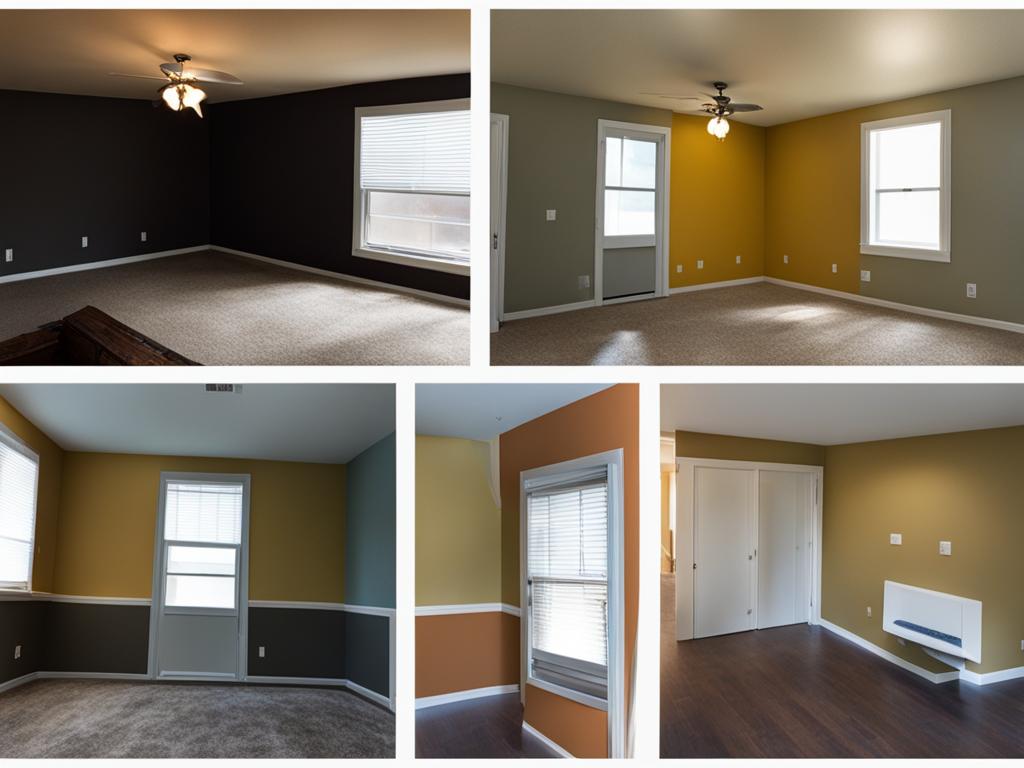
Health Effects of Mold Exposure
Mold exposure can have various health effects, ranging from mild allergic reactions to more severe respiratory problems. When mold spores are inhaled or come into contact with the skin, they can trigger allergic reactions in sensitive individuals.
Common symptoms of mold exposure include:
- Coughing
- Sneezing
- Headaches
- Respiratory issues such as asthma or bronchitis
For individuals with compromised immune systems or pre-existing respiratory conditions, mold exposure can exacerbate their symptoms and lead to more serious health complications.
It is crucial for tenants to be aware of the potential health risks associated with mold exposure and take appropriate measures to protect their health and well-being.
One of the most effective ways to ensure mold-free living conditions is through mold testing. By conducting regular mold testing, tenants can identify the presence of mold before it becomes a significant problem.
Mold Testing
Mold testing involves collecting samples from different areas of the property and sending them to a laboratory for analysis. The results of the mold test can help determine the types and quantity of mold present in the rental property.
By detecting mold early on, tenants can take appropriate action to address the issue promptly, ensuring their safety and well-being.
| Signs of Mold Testing | Benefits |
|---|---|
| Visible mold growth | Identify and address the source of the mold |
| Musty odor | Confirm the presence of mold even if it’s not visible |
| Water damage or leaks | Prevent future mold growth by repairing the source of moisture |
| Allergic reactions or respiratory symptoms | Take necessary steps to protect health and well-being |
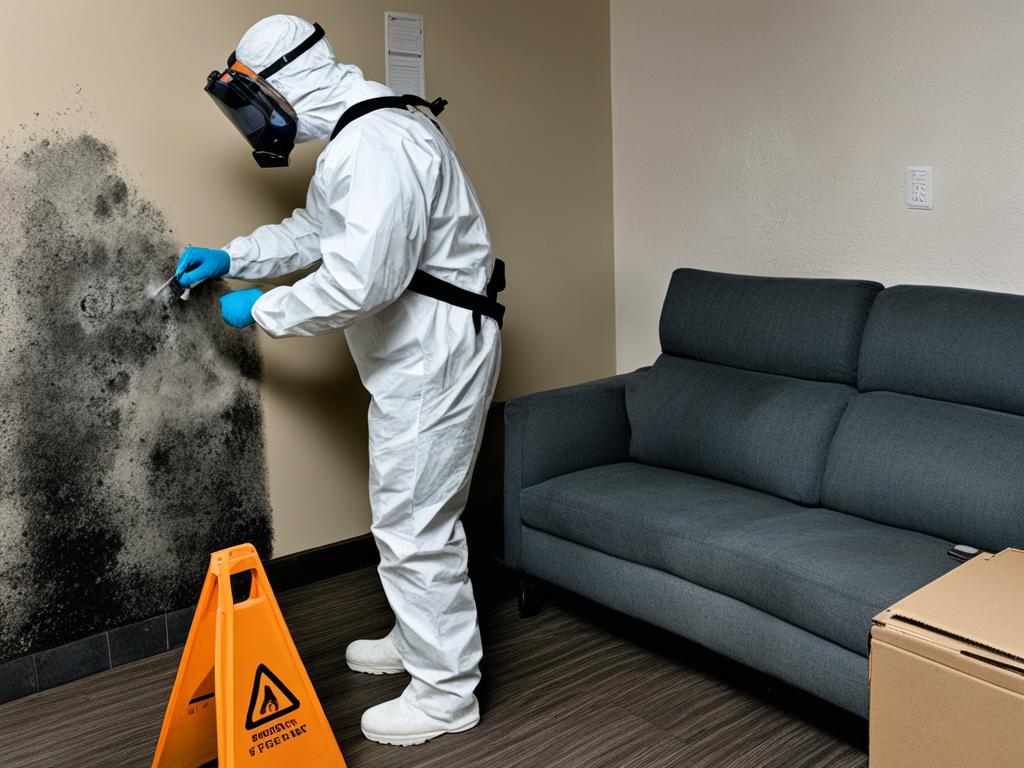
Remember, mold exposure can have serious health consequences. Take tenant safety seriously and prioritize mold testing to ensure a healthy living environment.
Seeking Legal Assistance
If you are facing a mold problem in your rental property and your landlord is not addressing the issue, it may be necessary to seek legal assistance. Consulting with a landlord-tenant lawyer can provide you with guidance on your rights, legal options, and potential remedies. They can help you navigate the legal process and take appropriate action to protect your health and rights as a tenant.
Understanding Tenant Rights
When dealing with mold-related issues, it is crucial to understand your rights as a tenant. A knowledgeable lawyer can explain the specific laws and regulations in your state regarding mold, landlord responsibilities, and tenant protections. They can help you determine if your landlord is in violation of any legal obligations and advise you on the best course of action.
Exploring Legal Options
A landlord’s failure to address a mold problem can result in hazardous living conditions and potential health risks for tenants. With the guidance of a lawyer, you can explore legal options to resolve the issue. These may include sending a demand letter to your landlord, filing a lawsuit, or seeking compensation for damages you have incurred as a result of the mold issue.
“Legal assistance is essential when dealing with mold-related disputes. A lawyer specializing in landlord-tenant law can help you navigate the complex legal landscape and ensure your rights are protected. They can advocate on your behalf, helping you achieve a fair resolution to your mold-related issues.”
Mold-Related Lawsuits
In some cases, tenant-landlord disputes regarding mold may escalate to the point where legal action becomes necessary. A lawyer experienced in mold-related lawsuits can help you build a strong case by gathering evidence, conducting investigations, and representing your interests in court, if needed.
Protecting Your Health and Rights
By seeking legal assistance, you can take proactive steps in protecting your health and asserting your rights as a tenant. A lawyer will ensure that you understand the legal implications of your situation, guide you through the necessary steps, and help you achieve a satisfactory resolution to your mold-related issues.
Remember, it is important to consult with a lawyer who specializes in landlord-tenant law and has experience handling mold-related cases. They will be familiar with the specific laws and regulations in your jurisdiction and can provide tailored advice based on your unique circumstances.
Resources for Tenant Support
When tenants are facing mold issues in their rental properties, it is crucial to know where to turn for assistance and guidance. Several resources are available to provide tenants with the necessary support to address their concerns and protect their rights. From tenant associations to legal aid organizations, these resources can offer valuable information, advice, and advocacy.
Local tenant associations are a valuable source of support and information for tenants dealing with mold problems. These associations are dedicated to protecting the rights and interests of renters and can provide guidance on tenant rights, landlord responsibilities, and legal avenues for resolving mold-related issues. Through tenant associations, tenants can connect with others who have faced similar challenges and gain insights into effective strategies for addressing mold problems.
Legal aid organizations are another essential resource for tenants in need of legal help. These organizations provide free or low-cost legal assistance to individuals who cannot afford a private attorney. They can offer guidance on tenant rights and responsibilities, help with legal paperwork, and represent tenants in negotiations or court proceedings. Legal aid organizations can be instrumental in ensuring that tenants receive the necessary legal support to hold landlords accountable for mold remediation.
Tenant advocacy groups also play a critical role in the fight against mold-related issues. These groups focus on promoting and protecting the rights of tenants and advocating for safe and healthy living conditions. They often provide educational materials, workshops, and support networks for tenants. By joining or reaching out to tenant advocacy groups, tenants can access valuable resources and connect with individuals who share similar concerns.
State and local government websites can also be a valuable source of tenant resources. These websites often provide information on tenant rights and responsibilities, landlord obligations, and legal assistance programs. Tenants can access relevant forms, reference materials, and contact information for agencies and organizations that can provide guidance and support.
Finding Tenant Resources
When seeking tenant resources, it is essential to use reliable and trusted sources. Seek organizations and agencies that specialize in tenant rights and advocacy, as they will have the expertise needed to address mold-related issues. Here are a few reliable national and local resources:
- Tenants’ Rights Hotline: A nationwide hotline that provides information, support, and guidance to tenants.
- National Low Income Housing Coalition (NLIHC): A nonprofit organization that advocates for affordable and safe housing for low-income individuals and families.
- Local Housing Authority: Contact your local housing authority for information on tenant rights and resources specific to your area.
Remember, tenant resources are there to help you understand your rights, provide guidance, and empower you to take necessary action. By utilizing these resources, tenants can navigate the complexities of mold-related issues, secure legal help if needed, and advocate for safe and healthy living conditions.
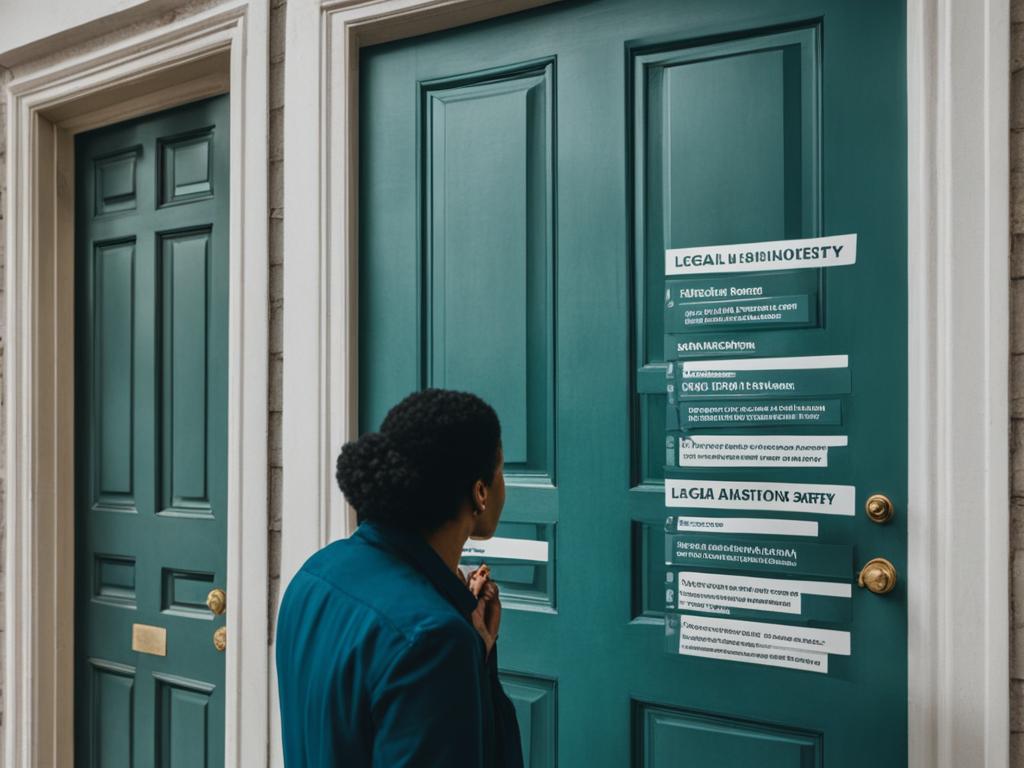
Environmental Testing and Remediation Companies
When dealing with mold issues, it is crucial to collaborate with reputable environmental testing and mold remediation companies. These specialists possess the necessary expertise and equipment to conduct accurate mold testing, identify the source of the problem, and safely remove the mold. Both tenants and landlords should prioritize hiring certified mold specialists to ensure effective mold remediation.
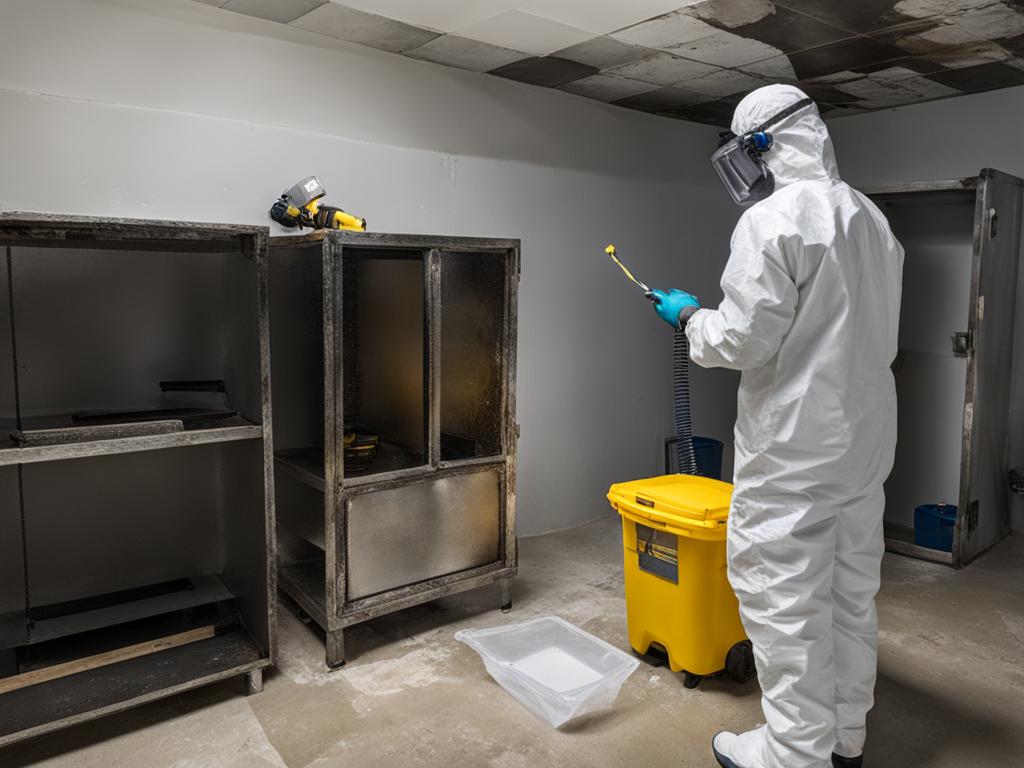
Conclusion
Tenant relocation due to mold is a serious issue that requires a clear understanding of tenant rights, legal options, and landlord responsibilities. Mold can have detrimental effects on the health and safety of tenants, making it crucial for landlords to address mold problems promptly and effectively.
Tenants should be proactive in reporting mold issues to their landlords, providing detailed information about the problem. If the landlord fails to address the mold problem, tenants have legal options to consider. They may choose to end the lease and seek alternative housing, file a lawsuit against the landlord, or hire a contractor to remediate the mold and deduct the cost from their rent.
In any case, it is advisable for tenants to consult with a landlord-tenant lawyer before taking legal action or making any major decisions. A lawyer can provide guidance on the specific tenant rights and legal procedures in their jurisdiction, ensuring that their rights are protected and they have the best chance of a successful outcome in their case.
Remember, the health and well-being of tenants should always be a top priority. By understanding their rights, exploring legal options, and taking proactive steps, tenants can ensure a safe living environment free from the dangers of mold.
FAQ
What are the landlord’s responsibilities for mold remediation in a rental property?
Landlords have a duty to remove mold conditions that materially affect the health or safety of tenants, provided certain conditions are met. These include proper written notice of the condition, the absence of tenant-caused damage, and not being delinquent in rent. Landlords have a reasonable amount of time to address mold issues after receiving notice from tenants.
What steps should I take when dealing with mold in my rental property?
If you suspect mold in your rental property, you should consult your lease agreement to understand your rights and responsibilities. Notify your landlord in writing about the mold problem, providing as much detail as possible. Request a mold inspection if necessary to confirm the presence and extent of the mold issue. If the landlord fails to address the problem, consider legal action or exploring other options for tenant relocation.
What are the legal options for tenant relocation due to mold?
If a landlord refuses to address a mold problem, tenants may have legal options for tenant relocation. This can include ending the lease and moving out, filing a lawsuit against the landlord, or hiring a contractor to repair the mold and deduct the cost from rent. However, it is important to consult with a landlord-tenant lawyer before taking action to ensure that your rights are protected and that you follow the appropriate legal procedures.
How does mold removal and remediation work in rental properties?
Mold removal and remediation should be performed by professionals to ensure the safety of tenants and proper removal of the mold. The process typically involves identifying the source of moisture, repairing any leaks or water damage, removing affected materials, and thoroughly cleaning the area. It is important for landlords to hire certified mold remediation professionals to address mold issues in rental properties.
What are tenant rights and protections regarding mold in rental properties?
Tenants have the right to live in a safe and habitable environment. Mold can pose health risks and create hazardous living conditions. If landlords fail to address mold issues, tenants may have legal grounds to demand repairs, seek compensation for damages, or terminate their lease. It is important for tenants to understand their rights and seek legal advice if their landlord is not addressing a mold problem.
How can mold in rental properties be prevented?
Both landlords and tenants have a role to play in preventing mold in rental properties. Landlords should ensure the property is properly maintained, addressing any water leaks or moisture issues promptly. Tenants should report any signs of mold or moisture to the landlord and maintain good housekeeping practices. Regular inspections, proper ventilation, and controlling humidity levels can help prevent mold growth in rental properties.
What are the health effects of mold exposure?
Mold exposure can have various health effects, ranging from mild allergic reactions to more severe respiratory problems. Common symptoms include coughing, sneezing, headaches, and respiratory issues such as asthma or bronchitis. It is important for tenants to be aware of the potential health risks associated with mold exposure and take appropriate measures to protect their health.
How can I seek legal assistance for mold issues in my rental property?
If you are facing a mold problem in your rental property and your landlord is not addressing the issue, it may be necessary to seek legal assistance. Consulting with a landlord-tenant lawyer can provide you with guidance on your rights, legal options, and potential remedies. They can help you navigate the legal process and take appropriate action to protect your health and rights as a tenant.
What resources are available for tenants facing mold issues in rental properties?
There are various resources available to tenants facing mold issues in rental properties. Local tenant associations, legal aid organizations, and tenant advocacy groups can provide information, advice, and support. Additionally, state and local government websites may have resources related to tenant rights, landlord responsibilities, and legal assistance.
How do I find reputable environmental testing and remediation companies for mold issues?
When dealing with mold issues, it is important to work with reputable environmental testing and mold remediation companies. These professionals have the expertise and equipment to accurately test for mold, identify the source of the problem, and safely remove the mold. Tenants and landlords should research and hire certified specialists to ensure proper and effective mold remediation.
What are the rights and options for tenant relocation due to mold?
Tenant relocation due to mold is a serious issue that requires proper understanding of tenant rights, legal options, and landlord responsibilities. Mold can have detrimental effects on the health and safety of tenants, and it is important for landlords to address mold problems promptly and effectively. Tenants should be proactive in reporting mold issues, seeking legal assistance if necessary, and taking steps to protect their health and well-being.

